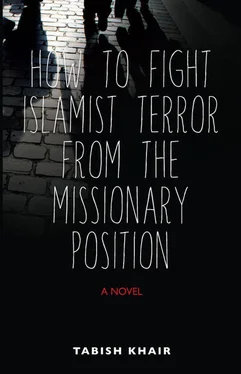It must have been then that she switched over to becoming a student of music. She still continued to take singing lessons and sometimes she gave singing lessons to kids. She also sang in that jazz band I have mentioned: they were booked to perform in public only four or five times every year, but they met and practiced for a few hours every week.
Though Ravi had been to a couple of her performances, I had not managed to attend any. The previous fixtures had coincided with exams or a date with Ms. Marx, or something like that. I knew that her jazz band was scheduled to perform in a café in Kolding late that November—I forget the exact date or day, though I think it was a Saturday—and so I drove over with Ms. Marx.
It was a nondescript café off the pedestrian street, slightly more than half-full, and I had expected to find Ravi there. We had actually planned to surprise Ravi and Lena by turning up. Lena was surprised and delighted to see us. But there was no sign of Ravi.
We found a corner table and ordered a bottle of white wine and some peanuts. When Lena joined us at the table during one of the breaks, I asked her if Ravi would be making an appearance later in the evening. She looked just a bit confused. “He might,” she said.
But the night wore on, the number of guests diminished, the jazz and early pop numbers got repeated, and Ravi did not turn up. Lena’s band was not bad: like Lena, all the band members were obviously hard workers. The music they created could not be faulted. Whether it was Billie Holiday, Anita Baker or Diana Krall, everything was rendered with precision and poise. But it lacked—though Ms. Marx thought I was being too demanding (Ravi-esque, she said, actually)—that extra element which could have made it memorable. The sound was clear, the lines sharp, but in its very perfection there was something missing—as if the souls of the compositions were trapped and stunted in the perfect bodies of their rendition.
We left a bit before ten, when the café started filling up again. Lena’s band was to play until midnight. Kolding is an hour’s drive from Århus and Ms. Marx dropped me at Karim’s flat just before eleven.
Karim had gone to bed—his door was almost closed—but Ravi was in the kitchen, working on revising his thesis. He had printed out what he hoped was the final version. It was this that had kept him from Kolding: he was reorganizing a central chapter in which he argued that the only way to understand the monstrosity of Nazism was to look at the “normal” concepts of law and order that framed even non-Nazi discourses in the mid-war period. He spoke about it for a few minutes before asking me what I thought of Lena’s singing.
“It was good,” I offered. “Very poised.”
“Everything she does is poised and good,” rejoined Ravi. At that moment, I heard this as a drop splashing off that full glass of love that Ravi had been bearing in his heart, though now I wonder why I did not consider it a sardonic statement.
“Yes,” I continued, feeling called upon to say something more, “one could hear her opera training. It is a pity she has given up opera.”
Ravi was shutting down his laptop now. He paused in the act and looked at me.
“I don’t know,” he said. “Do you recall those lines by Harrison where he talks about why he dislikes opera? He puts his finger on what is the soul of opera, and it is that soul which frightens him. One cannot be an opera singer unless one is undaunted by that frightful soul of opera, the non-rational excess at its core; one has to be willing to let go and face the freefall.”
Then, because he could see from my expression that I had no recollection of the lines, if I had ever read them, Ravi quoted the stanza from memory:
“What I hated in those soprano ranges
was uplift beyond all reason and control
and in a world where you say nothing changes
it seemed a sort of prick-tease of the soul.”
He picked up his laptop and went into his room, leaving me wondering.
Karim Bhai was a meticulous person. He liked keeping things in place. His room was the most orderly of all the rooms in our flat; Ravi’s was the most disorderly. But Ravi, I had noticed, had specific oases of order in his desert of disorder. The clothes in his wardrobe were always in a mess, jumbled up, and pulled out to be ironed—or half-ironed—only when required, but his toothbrush and shaving things had to stand exactly in the corner or on the shelf where he put them. His papers were always in a mess, but his books were carefully arranged—not alphabetically but by the year of birth of the author, so that his shelves gave you a fair idea of the history of publishing.
Compared to the books Ravi had in his soon-to-be-vacated office at the university and the room, Karim had very few. Not more than twenty or so, stacked in precise order in a cane bookrack at the back of his room. Like everything precious in the room, the bookrack was also kept covered, so that one could not read the titles of the books. I recall noticing this only during the last Friday Quran session that I attended in the flat.
No, “attended” is not the word. As usual, I had no intention of attending inane discussions about religious matters, culled mostly from a book written in an obscure Arabic dialect no one spoke any longer. Some of the subjects that exercised the intellects of Karim’s gathering—like clothing or food restrictions—were so much out of tune with my experience and life that I wondered what made Ravi go back to Karim’s Friday sessions time and again. At first, I thought it was due to idle curiosity. Then I assumed he continued to attend them out of courtesy to Karim and his guests, all of whom—with the exception of Ali—got along with Ravi and felt flattered by his interest. But finally I had to concede that Ravi derived more intellectual sustenance from the conversations than I could, perhaps because—not having grown up in a Muslim environment—he found some of the ideas and sentiments fresh or thought-provoking. I also suspected that Ravi was willfully blind to what I had increasingly come to see as the fascist face of Islamism. He hated that suggestion, and with good cause, for in the West, Islam itself is considered fascist or prone to fascism. Ravi objected to that. He argued that Islamism, because it considered Islam universally valid for all human beings, could not be fascist, because fascism was an ideology of ethnic, racist or nationalist exclusiveness.
He might have been right, intellectually. But what Ravi forgot was that Islam, like any other religion or even an atheistic ideology like communism, could be put to fascist uses, and that many Islamic fundamentalists—with their mobs and chanting, their whips and executions, their insistence on absolute obedience—behaved very much like fascists.
I recall the discussion that Friday had to do with an example of what I still consider fascism in an Islamist mask. But, of course, I was not part of the discussion. I was waiting in the kitchen for Ravi to finish. We were supposed to meet Lena and some other friends later in the evening: we had tickets to a jazzed-up version, its operatic airs replaced by pop songs, of Lucia di Lammermoor , which was playing at a local theater. By then it had started becoming clear to me that things were not going well between Lena and Ravi any longer—not because they had fallen out of love but because, in different ways, they were still too much in love. I think the two of them were trying to do what they could to make it work, and the theater outing was part of that endeavor.
As I waited for Ravi to finish, I heard the conversation take a nasty turn in Karim’s room. It also took a political turn, which was unusual. In the past, Karim had firmly stepped in and stoppered the genie of politics from being released. But that Friday Karim was distracted—he had been called away on his mysterious trips too often in recent weeks and had been working a lot as well—or simply unwilling to interfere. I must add that the second interpretation came to me later, when I spoke to the police about this particular Friday discussion.
Читать дальше












